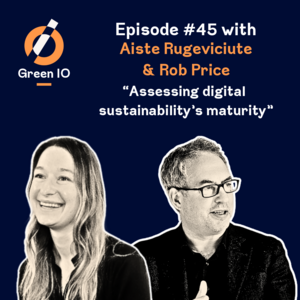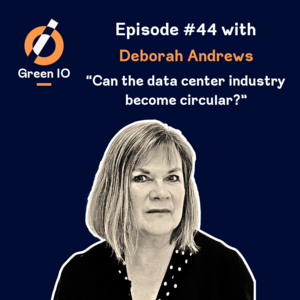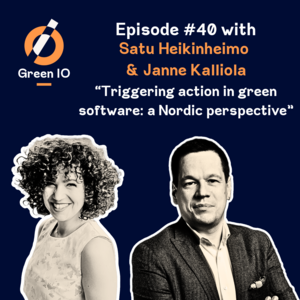#32 - How systemic thinking can empower sustainable design? with Sylvie Daumal and Thorsten Jonas
Update: 2024-02-13
Description
How can we make systemic design operational for sustainable design?
🔧Systemic design is dedicated to handling complex systems, complex questions, and complex issues.
Sounds familiar with Sustainability? But if things are so complex how digital product people willing to design sustainably can embrace them?
In this episode, we dive deep into the world of systemic design and how it can help us increase digital sustainability. Don't miss out on insights from Sylvie Daumal (acclaimed author of 'Design d'expérience utilisateur' ) and Thorsten Jonas (founder of the SUX Network), as Gaël Duez discusses the operationality of systemic design in Tech.
❤️ Subscribe, follow, like, ... stay connected the way you want to never miss our episode, twice a month, on Tuesday!
🔧Systemic design is dedicated to handling complex systems, complex questions, and complex issues.
Sounds familiar with Sustainability? But if things are so complex how digital product people willing to design sustainably can embrace them?
In this episode, we dive deep into the world of systemic design and how it can help us increase digital sustainability. Don't miss out on insights from Sylvie Daumal (acclaimed author of 'Design d'expérience utilisateur' ) and Thorsten Jonas (founder of the SUX Network), as Gaël Duez discusses the operationality of systemic design in Tech.
❤️ Subscribe, follow, like, ... stay connected the way you want to never miss our episode, twice a month, on Tuesday!
📧 Once a month, you get carefully curated news on digital sustainability packed with exclusive Green IO contents, subscribe to the Green IO newsletter here.
📣 Green IO next Conference is in Singapore on April 18th (use the voucher GREENIOVIP to get a free ticket)
📣 Green IO next Conference is in Singapore on April 18th (use the voucher GREENIOVIP to get a free ticket)
Learn more about our guest and connect:
📧 You can also send us an email at greenio@duez.com to share your feedback and suggest future guests or topics.
Sylvie and Thorsten's sources and other references mentioned in this episode:
- SUX network and its SUX podcast
- Design d'expérience utilisateur - 3e édition: Principes et méthodes UX
- Apple’s Mother Earth video
- Future Wheel
- The Fifth Discipline: The Art & Practice of The Learning Organization
- Systems Archetypes
- Sahel : le recul du désert
- Sécheresse, désertification et reverdissement au Sahel
- Pour une Hydrologie Régénérative
- Can rock dams combat climate change?
- Structured dialogic design
- Dialogic Design Science
Transcript
Gaël (00:17 .)
Hello everyone. Welcome to Green IO, the podcast for responsible technologists building a greener digital world, one byte at a time. Every two Tuesdays, our guests from across the globe share insights, tools and alternative approaches enabling people within the tech sector and beyond to boost digital sustainability.
You know, when I discuss with fellow digital sustainability enthusiasts about sustainable design, I often hear these statements. It's systemic. We need to see the big picture beyond our own company, our own clients. We need to fundamentally change the way we think about design, if we want to design for a better future. We must move from human centered to planet centered design. I couldn't agree more. But I also recall a conversation I had some months ago with a researcher in economics. We were talking about Donella Meadows’ book, « Thinking in Systems », and her position was, well, let's say abrupt. It's a good idea on paper, but it's not operational. You cannot modelize it. So, I was wondering, how operational is it for us working in the digital sector? How do we transform into actions the statements which I listed previously? And to answer these questions, I'm glad to be joined today by two experts in systemic design: Sylvie Daumal and Thorsten Jonas.
Sylvie is based in Paris and she is somehow a rockstar in France when it comes to systemic design, a field she has been invested in since the early 2000s. She wrote a book last year, « 58 tools for systemic design », a very technical book, which has been acclaimed in the French design community. And on a more personal note, I'm so happy that we managed to record this episode, which has been rescheduled four times, I think - record broken.
Gaël (02:20 )
Thorsten is based in Hamburg. He has been in UX design for almost 20 years, if not more than 20 years, and he founded Sustainable UX Network two years ago. A community who has gathered an impressive momentum with more than 2000 very active members across Europe, and all over the world. We share quite a lot with Thorsten, who is a fellow podcaster, a fellow speaker, a fellow community builder, and whom I see the name popping up on every cool event I'd like to join. And yet, we didn't manage to meet until today, despite me spending quite a lot of time in Hamburg when I was working with my former colleagues. So, welcome Sylvie, welcome Thorsten. Thanks a lot for joining Green IO here today.
Thorsten (03.01)
Thank you very much for having me.
Sylvie (03:04 )
Thank you, Gaël.
Gaël (03:07 )
So, the big, big question I stated in the introduction: how can we make systemic design operational? And maybe, before jumping on the question, maybe we should remind ourselves, what is systemic design and why is it useful? Sylvie, do you want to start maybe with some kind of a definition?
Sylvie (03:32 )
Systemic design is dedicated to handling complex systems, complex questions, complex issues. It is used mostly when you have questions about any kind of subject that involves many people, that involves many bots. The fact is that systemic thinkers are people who have a special angle to see things. The system is not really existing on its own, it's just the way that you see things. And what is the big characteristic of the system, is the fact that to identify many, many parts in a situation and all the parts are in interaction, one with the other. That's the reason why it is most of the time very complex, because it creates what we call causal loops. It means that one cause can have a consequence. A consequence will have a cause on another part of the system and so on.
So... at the very end, you can see that every action, every interaction has a consequence on the whole system. So, it's a way to really envision the whole situation. But most of the time, all the problems are complex.
Gaël (05:11 )
Which makes it useful also for digital design, digital services. Thorsten, I think that's something that you've advocated again and again and again in your public speaking these last years, that we need to embrace systemic thinking also when we design digital services. Could you maybe elaborate a bit on this?
Thorsten (05:36 )
Sure. I think one of the key things of UX design is that we focus on the user, right? We want to build great experiences, great products for our users. And that's what we advocate for. And that's what we try to make other stakeholders understand, that it's valuable to focus on the user and to fulfill the user's needs. And we have been doing this for many years. The problem is, by focusing so much on the user, we totally forget about all the other actors that are somehow influenced by the product, by the experience that we build. So all the tools we use in UX are not taking into account the systemic context of the product, of the experience that we build.
And another actor could be a human being could also be the planet, the environment, whatever, everything that is influenced by what we build. And I think this is a really big problem, because very often someone or something else pays the price for the good user experience that we build for our users. Let's say I build a nice service and a nice app for ordering my groceries from home. There are several big services out there that do this, and their advertising is pretty aggressive.
You could say, it's a good user experience and it's very convenient for the user. I'm just sitting on my couch. I can order my groceries via app and then maybe 30 minutes later, someone shows up at my door and the only thing I have to do is walk up to my door and pick up the stuff. But who pays the price? Well, it's the delivery riders that are not paid well, that for a long time are even not employed, but so-called ‘self-employed’. These services have a very aggressive pricing policy, so it cannot be matched by the small grocery stores we have here in our big cities, etc. So, for the convenience and for the great user experience, someone or something else pays the price. And that is something I think we in UX for too long have not taken into account. And as I said in the beginning, it's not part
Comments
Top Podcasts
The Best New Comedy Podcast Right Now – June 2024The Best News Podcast Right Now – June 2024The Best New Business Podcast Right Now – June 2024The Best New Sports Podcast Right Now – June 2024The Best New True Crime Podcast Right Now – June 2024The Best New Joe Rogan Experience Podcast Right Now – June 20The Best New Dan Bongino Show Podcast Right Now – June 20The Best New Mark Levin Podcast – June 2024
In Channel
























